
M.U.L.E. is a multiplayer video game written for Atari 8-bit computers by Ozark Softscape. Designer Danielle Bunten Berry takes advantage of the four joystick ports of the Atari 400 and 800 to allow four-player simultaneous play. Published in 1983, M.U.L.E. was one of the first five games from new company Electronic Arts, alongside Axis Assassin, Archon: The Light and the Dark, Worms?, and Hard Hat Mack. It is primarily a turn-based strategy game, but incorporates real-time elements where players compete directly as well as aspects that simulate economics.

Master of Orion is a turn-based, 4X science fiction strategy game in which the player leads one of ten races to dominate the galaxy through a combination of diplomacy and conquest while developing technology, exploring and colonizing star systems.
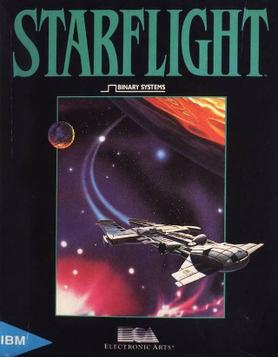
Starflight is a space exploration, combat, and trading role-playing video game created by Binary Systems and published by Electronic Arts in 1986. Originally developed for IBM PC compatibles, it was later ported to the Amiga, Atari ST, Macintosh, and Commodore 64. A fully revamped version of the game was released for the Sega Genesis in 1991.
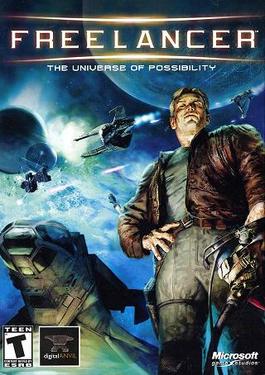
Freelancer is a space trading and combat simulation video game developed by Digital Anvil and published by Microsoft Game Studios. It is a chronological sequel to Digital Anvil's Starlancer, a combat flight simulator released in 2000. The game was initially announced by Chris Roberts in 1999, and following many production schedule mishaps and a buyout of Digital Anvil by Microsoft, it was eventually released in March 2003.

Ascendancy is a 4X science fiction turn-based strategy computer game. It was originally released for MS-DOS in 1995 and was updated and re-released for iOS in 2011 by The Logic Factory. Ascendancy is a galactic struggle to become the dominant life form, hence the title. The game's introductory cinematic states: "Wildly different cultures competed for the same worlds. In the enormous upheaval that followed, one of these species would gain ascendancy."
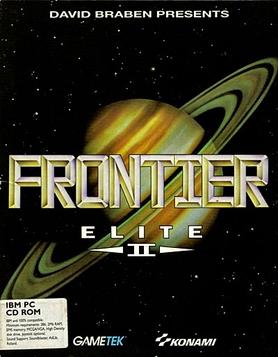
Frontier: Elite II is a space trading and combat simulator video game written by David Braben and published by GameTek and Konami in October 1993 and released on the Amiga, Atari ST and DOS. It is the first sequel to the seminal game Elite from 1984.
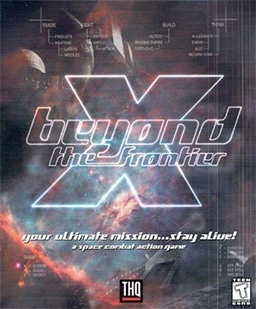
X: Beyond the Frontier is a video game created by Egosoft for Windows. The first of the X series, it is a space trading and combat simulator game, mostly set in the fictional X-Universe. Upon release, it was frequently compared to the older Elite.

X3: Reunion is a single-player space trading and combat video game developed by Egosoft and published by Deep Silver. It is the third installment in the X series and the sequel to X2: The Threat (2003), which in turn followed X: Beyond the Frontier (1999). X3: Reunion was released originally for Windows in 2005. The game was later ported to Mac OS X and Linux.

Galactic Civilizations II: Dread Lords is a 4X turn-based strategy by Stardock for Microsoft Windows. It is the sequel to the 2003 game, Galactic Civilizations, and was released at retail and on Stardock's online subscription service, TotalGaming.net, on February 21, 2006. An expansion, Dark Avatar, was released in February 2007. A second expansion, Twilight of the Arnor, was released in April 2008.

Master of Orion II: Battle at Antares is a 4X turn-based strategy game set in space, designed by Steve Barcia and Ken Burd, and developed by Simtex, who developed its predecessor Master of Orion and Master of Magic. The PC version was published by MicroProse in 1996, and the Macintosh version a year later by MacSoft, in partnership with MicroProse. The game has retained a large fan base, and is still played online.

Capitalism is a business simulation video game first published in 1995 by Interactive Magic, developed by Enlight for the Macintosh and MS-DOS and designed by Trevor Chan.
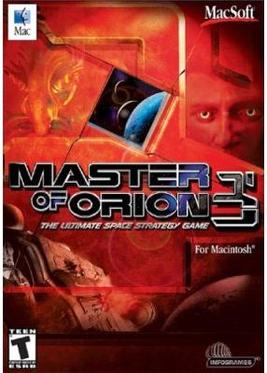
Master of Orion III is a 4X turn-based strategy game and the third in the Master of Orion series. Master of Orion III was developed by Quicksilver Software and published by Infogrames Interactive on February 25, 2003.

Awesome is a science fiction action video game released by Psygnosis for the Amiga in 1990. It features a variety of gameplay styles, from overhead shooting to Asteroids-esque sequences, and a pre-rendered ray-traced intro. The objective is to traverse the galaxy despite not having the funds or fuel to do it.
Star Trader is a 1974 video game and an early example of the space trading genre. The game involves players moving from star to star on a map of the galaxy, buying and selling quantities of six types of merchandise in a competition to make the most money. The game was developed by Dave Kaufman for computers in 1973, and its BASIC source code was printed in the January 1974 issue of the People's Computer Company Newsletter. It was reprinted in the 1977 book What to Do After You Hit Return. The game was the inspiration for the multiplayer Trade Wars series, beginning in 1984, and is thought to be the antecedent to much of the space trading genre.

Rogue Galaxy is an action role-playing video game developed by Level-5 and published by Sony Computer Entertainment for the PlayStation 2. It was originally released exclusively in Japan in December 2005; a director's cut of the game with enhancements and changes was released in 2007 for North America in January, Japan in March and PAL territories in September.

Starship Catan is a two-player card game, loosely based on the Starfarers of Catan board game. As a member of the Catan family of games, it is designed by Klaus Teuber, and distributed by Kosmos in German and Mayfair Games in English.
Empire is the name of a computer game written for the PLATO system in 1973. It is significant for being quite probably the first networked multiplayer arena shooter-style game. It may also be the first networked multiplayer action game.
Construction and management simulation (CMS), sometimes also called management sim or building sim, is a subgenre of simulation game in which players build, expand or manage fictional communities or projects with limited resources. Strategy video games sometimes incorporate CMS aspects into their game economy, as players must manage resources while expanding their project. Pure CMS games differ from strategy games, however, in that "the player's goal is not to defeat an enemy, but to build something within the context of an ongoing process." Games in this category are sometimes also called "management games".
Star Sonata is a space-themed massively multiplayer online role-playing game (MMO) by American studio Star Sonata LLC released in 2004 that combines elements of action games and real-time strategy games such as real-time ship-to-ship combat and galactic conquest.

Endless Space 2 is a turn-based strategy 4X game developed by Amplitude Studios and published by Sega. It is the sequel to Endless Space, which was released in 2012. The game had been made available through Steam's early access program since October 2016. It was released on 18 May 2017, and received positive reviews.
















